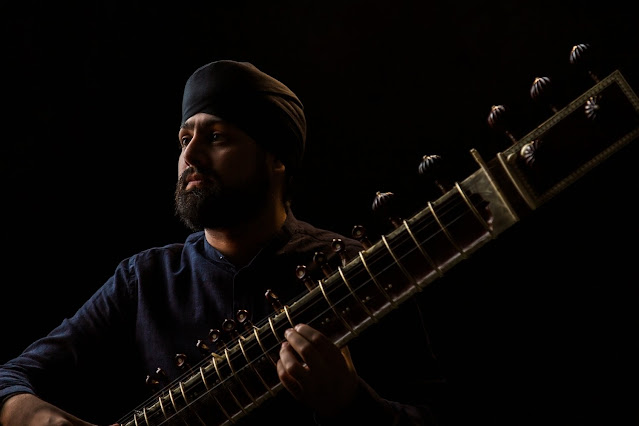 |
| Jasdeep Singh Degun |
Jasdeep Singh Degun's tour of Anomaly featuring music from his acclaimed Real World Records debut disc opens on 17 May 2023 at the Howard Assembly Room in Leeds and continues to Norwich, Nottingham, Southampton, Rotterdam in the Netherlands, Manchester and Liverpool [see website for details]. We met up earlier this month, whilst he was in London (the previous day he had been on BBC Radio 3's In Tune) to chat about Anomaly, and working with both Western classical and Indian classical musics.
Jasdeep is a sitar player and composer whose work in Indian classical music has crossed over into Western classical in such projects as Arya, his 2020 concerto for sitar written for Opera North, and for Opera North's Orpheus project which combined Monteverdi's opera with Indian classical music and for which Jasdeep was the co-musical director (with Lawrence Cummings).Born in Leeds to Punjabi parents who came to the UK in the 1980s, in person, Jasdeep embodies this dual heritage, he wears a turban yet speaks with a distinct Leeds accent. At one point during our interview he comments that he is just a 'random guy from Leeds', he does not come from a musical family, his involvement in Indian classical music began at the local community centre and he only started concentrating on studying the sitar when he was in his teens, which is relatively late. He studied sitar with Ustad Dharambir Singh MBE, his teacher.
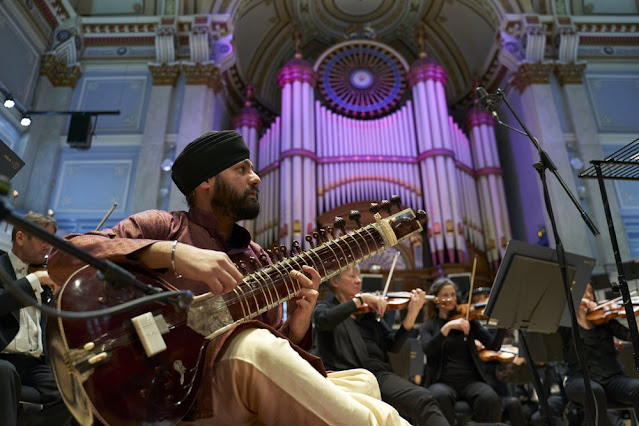 |
| Jasdeep Singh Degun performing Arya: concerto for sitar and orchestra with Orchestra of Opera North (Photo Justin Slee) |
For the tour Jasdeep is performing with an eight-piece ensemble, presenting a somewhat condensed version of the music on the disc. The ensemble includes five Indian instruments, sitar, tabla, mridangam (a drum-like percussion instrument), esraj (a bowed stringed instrument) and santoor (a hammered dulcimer) along with double bass, cello, guitar and pianist.
The album has had quite a long gestation period. In 2016, Jasdeep received a scholarship from Sky Arts. There was a long application process and ultimately five scholarships were given across various art forms. Jasdeep received a scholarship of £30,000 and felt rather a lot of responsibility. Up till then, he had performed the sitar in other people's music both as a session musician and whilst performing Indian classical music. But performing other people's music meant that in each project there was always something that did not fit him, it was someone else's vision. Also, it was tricky for Indian classical musicians to make a proper career as there was no infrastructure and no agents. So, he wanted to use the scholarship money to shed light on the talent in Indian classical music in this country. The recording used around 30 musicians in total of whom 15 were Indian classical. But he also wanted to make a contemporary album, not a strictly Indian classical one, he wanted it to be accessible and enjoyable, whilst steeping listeners in Indian classical music without them knowing it. This is, in fact, something that he tries to do in all of his projects, to bring in as much good Indian classical music.
He is at pains to emphasise that at heart, he remains an Indian classical musician, playing this first and foremost. He will never leave it and he never should, and he affirms that if he cannot deliver Indian classical music then he is nothing. But he also enjoys working with other musicians on different styles of music. In parallel to his Indian classical training, he trained in Western classical so he regards himself as a good bridge between the two styles, and we got into a fascinating discussion about quite how he manages to combine the two.
He explains that Indian classical music has highly developed melodic and rhythmical elements, but harmonically it is quite straightforward because everything happens over a drone, whereas in Western classical music, harmony is everything and the melodic and rhythmic elements are not as highly developed as in Indian classical. The cross over between the two is tricky, some Indian classical musicians have a basic understanding of harmony, but Western classical musicians can lack knowledge of the way Indian classical music works. Jasdeep tries to bring the two together, so his music is harmonically rich, yet follows Indian classical rules, though he acknowledges that when combining the two, some things work and some do not.
From the beginning, he studied piano and was part of the Yorkshire Young Musicians scheme at the Leeds College of Music as well as singing in the school choir. Whilst he was studying ethnomusicology at SOAS he also took a composition module at King's College London and later worked with both Errollyn Wallen and Will Todd. He admits that his training in Western classical music is not as extensive as Indian classical and with a grin he says that he is still learning.
Indian classical is based on raags (modes) but these are more than basic scales, there are ascending and descending rules, notes that you are not allowed to use and lots more. There are seven or eight raags that have the same basic scale, but the treatment of the notes is very different. When Jasdeep writes he uses the rules of Western classical counterpoint but superimposes the rules of the raag. This means that the harmonic language is very rich. The Indian classical listener feels comfortable, yet Western classical listeners feel supported harmonically because the counterpoint is there.
Orpheus, which was performed by Opera North in 2022, featured opera singers and Western classical musicians performing alongside Indian classical singers and musicians in a theatre piece that combined Monteverdi's music with Jasdeep's own, bridging the two worlds. The project was a collaboration between Opera North and South Asian Arts UK, a Leeds-based Indian classical organisation which was founded by Jasdeep's teacher Dharambir Singh. Jasdeep has had a personal relationship with South Asian Arts for 25 years, being involved when he was a child and later teaching there. South Asian Arts UK and Opera North have collaborated on projects before, and Jasdeep worked on one of these before Opera North commissioned Arya, his sitar concerto which he premiered with the orchestra of Opera North at Huddersfield Town Hall in 2020.
Orfeo began simply as an idea, with Lawrence Cummings and Jasdeep's teacher, Ustad Dharambir Singh talking about ideas, though Dharambir Singh was only ever an advisor. Jasdeep thought that there might be something in the idea as there are links between the two styles, both use an element of improvisation. Indian classical music is always improvised, albeit within set parameters, whilst in Monteverdi everything is inferred, the music as written down is quite basic. But there are also differences.
There were initial workshops, which were more experiments in engagement between the two musical styles. But then the pandemic came, and Jasdeep's involvement started in earnest once the project re-started after the pandemic. He was concerned about how to do it properly, how to bring the two musical cultures together in a way that respected both. After all, Indian classical singers do not usually act on stage, and it would be certainly reductionist to play Monteverdi on a sitar. Similarly, it would be disrespectful to a Western instrumentalist to simply place them in a situation with Indian classical singers and instrumentalists where there was no score and all were improvising.
With Orpheus, the result is a piece that melded the two musical worlds, with Jasdeep's contribution written over a relatively short time. He explains to me, in one example, how he brought the two together. In Monteverdi, singers would often create ornaments just before a cadence, whereas for Indian classical singers these occur after the cadence, so this meant that Jasdeep could create a duet where the Western classical singer finished on a cadence, and had their ornamentation echoed by the Indian classical singer.
That Jasdeep was trained in both systems helped during rehearsals, as the two use different modes of time measurement, and it was details like this that developed during rehearsal that also helped bridge the two worlds. All concerned were excellent musicians, and Jasdeep was able to form a bridge thanks to his understanding of what each side needed. For him, the process is as important as the end result (something he emphasises a few times during our chat), and he found the process of developing and rehearsing Orpheus satisfying and important. Thankfully the end result was a success too, garnering critical plaudits and justifying Opera North's faith in him. That the end result was good was a great relief, the way that the process developed so that the work was respectful to all the musicians and the composers and the different musical styles.
From the start, there was the worry that with such a large-scale experimental project, would it actually sell tickets? It did. However, it was a massive learning curve, but Jasdeep feels that the integrity of both musical styles shone through. But the transitions between the two elements were important and were in the right context in the opera.
The original intention was that the opera would be in Italian (the Western classical singers), Hindi and Urdu but there were different musicians from different places on the Indian sub-continent and in the end they sang in their own languages, thus giving them more agency in the music. The result was a piece that felt natural but used six languages, all happening organically. Whilst Jasdeep had worked on Migrations with the composer Will Todd (performed in 2022 by Welsh National Opera, see my review), Orpheus was very much his first large-scale stage project, and he is thankful that Opera North trusted him, an unknown composer, to let him do what he wanted to do.
Also, last year, as if he was not busy enough, he released his album Anomaly. The album was released on Real World Records (founded in 1989 by Peter Gabriel), who have signed him as an artist. This sort of high-profile signing does not happen routinely for Indian classical performers, and Jasdeep hopes that he is very much the first domino. In fact, he pitched the album to so many different labels, only for each to say that the musical style did not fit their roster.
Jasdeep is very much aware of his good luck and the support that organisations like Opera North and Real World Records have given him. His parents are not musical, and he studied in a state school without private music lessons. He hopes that his success will open the gates to other Indian classical musicians. He has been appointed artist-in-residence at Opera North and is working on a piece with the chorus of Opera North for the Summer which will involve Indian classical musicians as well.
Never miss out on future posts by following us
The blog is free, but I'd be delighted if you were to show your appreciation by buying me a coffee.
Elsewhere on this blog
- Then I play'd upon the Harpsichord: Ensemble Hesperi's engaging look at the musical life of Queen Charlotte - video review
- A love of telling stories: Norwegian composer Bjørn Morten Christophersen on setting Charles Darwin's 'On the Origin of Species' to music - interview
- Finding his way: Opera Rara's revival of Donizetti's relatively early L'esule di Roma showed a composer finding his own voice - opera review
- Giovanni Legrenzi: Rinaldo Alessandrini and Concerto Italiano explore motets by one of Venice's most prominent composers - record review
- The Library of a Prussian Princess: Ensemble Augelletti at the Newbury Spring Festival - concert review
- Meditating, listening & letting the music unfold: Syrian composer & musician Maya Youssef on the inspirations behind her music - interview
- Cautionary Tales: the current cohort of Young Artists from the National Opera Studio in an evening of contemporary opera - opera review
- Temple Song: Kate Royal, Christine Rice & Julius Drake in Brahms, Schumann and Weill - concert review
- Silence, texture and atmosphere: music by John Luther Adams, Kaija Saariaho, Judith Weir, and Gary Carpenter at Royal Academy of Music's Fragile Festival - concert review
- Casta Diva: trumpeter Matilda Lloyd showing just what her instrument can do with elegant yet dazzling accounts of Italian bel canto arias - concert & record review
- Stop Motion Music: Edinburgh-based composer Neil T. Smith chats about his new disc, exploring the smaller-scale works he has written from the last eight years - interview
- Home


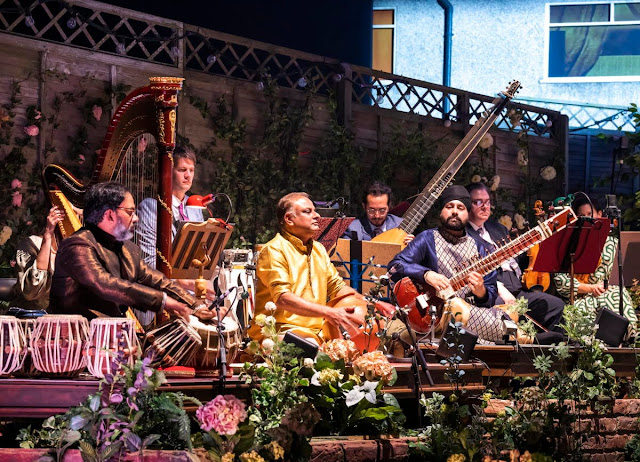
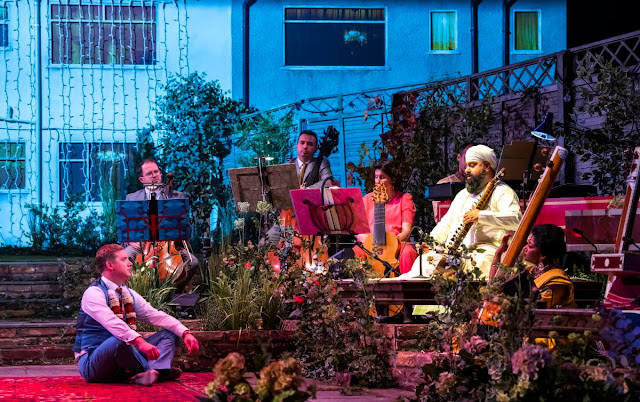
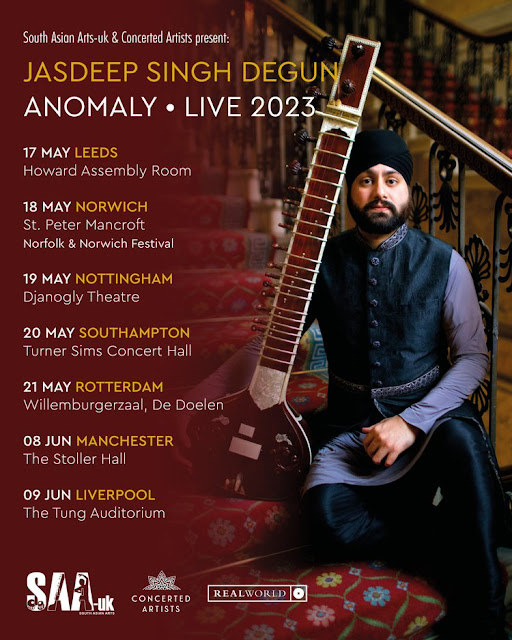

.jpg)

.jpeg)





.jpeg)
No comments:
Post a Comment